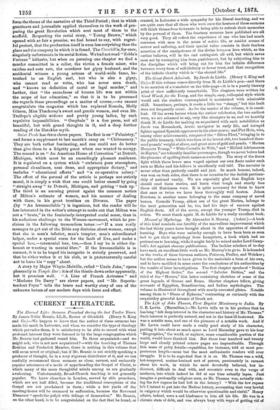CURRENT LITERATURE.
The Eternal Life: Sermons Preached during the last Twelve Years. By James Noble Bennie, LL.B., Rector of Glenfield. (Henry S. King and Co.)—We happen to know that the author of these sermons has made his mark in Leicester, and when we consider the type of theology which pervades them, it is satisfactory to be able to record with what profound interest they were listened to by the large congregation which Mr. Bennie had gathered round him. To those acquainted—and we might ask, who is not now acquainted ?—with the teaching of Thomas Erskine and Frodenick Maurice, there is nothing in this volume that will seem novel or original ; but if Mr. Bennie is not strictly speaking a producer of thought, he is a very Rigorous distributor of it, and we can cordially recommend those sermons as clear, earnest, and eminently popular utterances of a mode of apprehending the Gospel of Christ, to which many of the MOTO thoughtful minds among us are gradually awakening. Unfortunately, Broad-Church teaching is not generally popular. We know churches in London, served by able preachers, which are not half filled, because the traditional conceptions of the Gospel are not proclaimed in them; while a few yards off the meeting-house will be crammed to suffocation, because the Reverend Ebenezer "spools the pulpit with tidings of damnation." Mr. Bennie, on the other hand, is to be congratulated on the fact that he found, or
created, in Leicester a wide sympathy for his liberal teaching, and we are quite sure that all those who were once the hearers of them sermons will think themselves fortunate in being able to refresh their memories by the perusal of them. The fourteen sermons here published are all very good. They all reflect the experience of one who has had much converse with men in the arena of active life, or amidst scenes of sorrow and suffering, and their special value consists in their fearless assertion of the omnipotence of the divine love,—a love which, as the author believes, will in the end extinguish all evil, but which saves man not by exempting him from punishment, but by subjecting him to the discipline which will bring out for him the infinite difference between every form of self-idolatry or lower trust, and that recognition of the infinite charity which is "the eternal life."


































 Previous page
Previous page